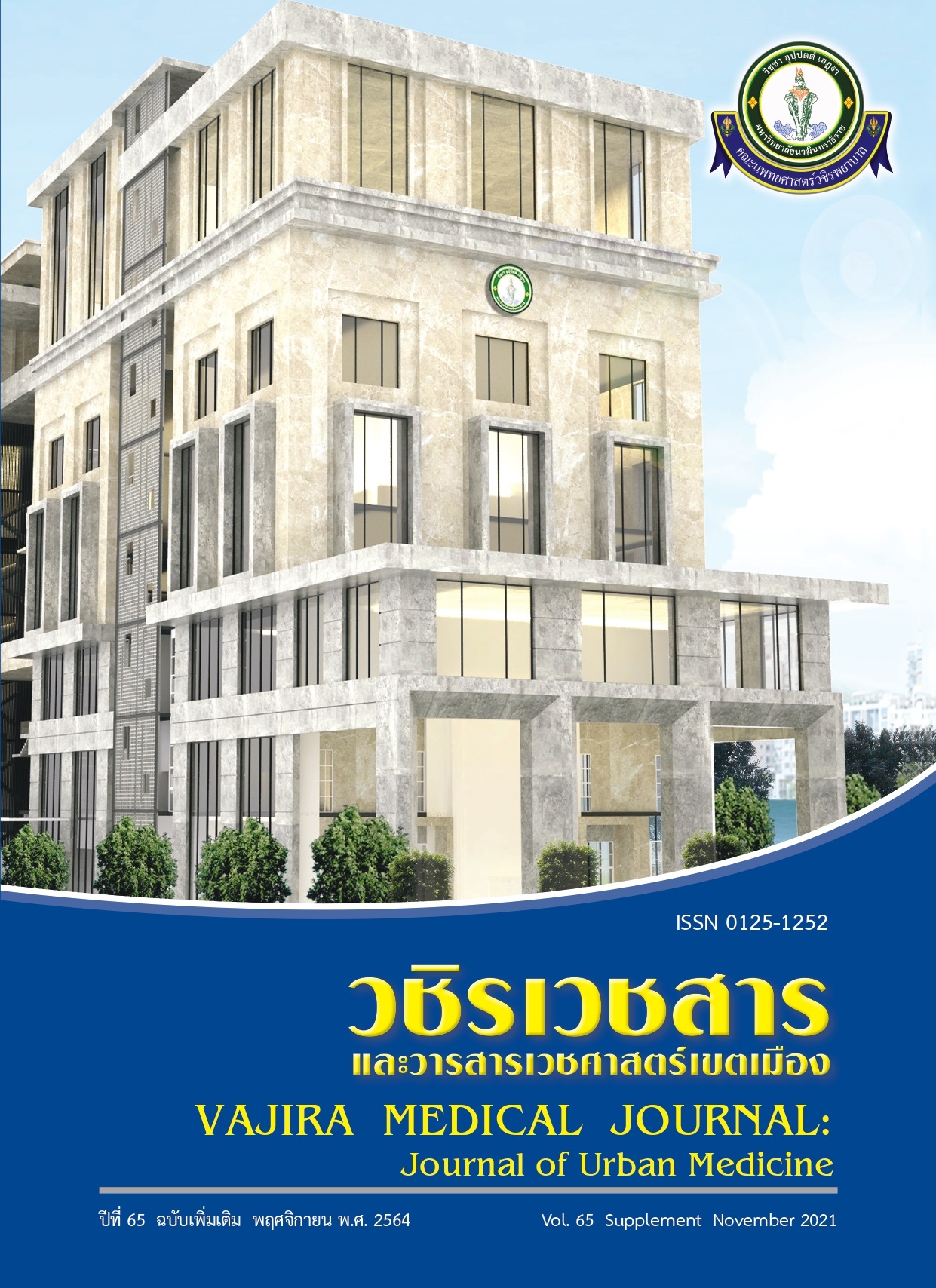Prevalence and Risk Factors of Dementia in HIV-Infected Patients in the Era of Highly Active Antiretroviral Therapy (HAART)
Main Article Content
Abstract
Background: Human immunodeficiency virus (HIV) infection is an epidemic worldwide. Despite the combination of antiretroviral therapy to control disease, a higher rate of neurocognitive impairment has been reported. Because highly active antiretroviral therapy (HAART) may not prevent the entry of HIV into the central nervous system, neuronal damage can be affected. Therefore, we conduct the study to evaluate the prevalence and associated factors of HIV-associated neurocognitive disorder.
Methods: We conducted a cross-sectional study in Vajira hospital, a 900-bed university hospital in Bangkok, Thailand. HIV-infected patients who on HAART routinely visit the infectious clinic from August 2019 to March 2021 were included in our study. We collected the MoCA-Thai test and search patient information from the electronic database. Then we analyze the prevalence and factors associated with HIV-associated neurocognitive disorder.
Results: We enrolled 84 patients with HIV infection, (42 men and women). The mean age of our cohort is 63 years (SD, ± 3.9). The duration of HIV infection and duration of current HAART was 13 years (SD, ± 5.7) and 10 years (SD, ± 4.8), respectively. The median CD4 count before HAART was 187 cell/mm3 (IQR, 47.25-323). The median of the CD4 level at the time of enrollment was 507 cell/mm3 (IQR, 319.25-706.25). MoCA scores of less than 26 points were found in 77 (91.7%) patients. Dementia was diagnosed in 13 (15.5%) patients. In adjusted analysis, patients with age equal or more than 65 years were more likely to have dementia than younger patients (OR = 0.14, 95%CI 1.95-26.17: p-value = 0.002) also with years of education less than 9 years (OR = 0.18, 95%CI 1.17-27.38 : p-value = 0.031). Whereas the duration of HIV infection, CD4 level, CPE score, and PI-base regimen were not associated with dementia.
Conclusion: The risk of dementia in HIV patients is significantly higher in older age (equal to or more than 65 years) or years of education less than 9 years.
Downloads
Article Details

This work is licensed under a Creative Commons Attribution-NonCommercial-NoDerivatives 4.0 International License.
References
HIV Info HUB [Internet]. [cited 2021 Nov 25]. Available from: https://hivhub.ddc.moph.go.th/epidemic.php
Xia C, Luo D, Yu X, Jiang S, Liu S. HIV-associated dementia in the era of highly active antiretroviral therapy (HAART). Microbes Infect 2011;13(5):419–25.
Clifford DB, Ances BM. HIV-associated neurocognitive disorder. Lancet Infect Dis 2013;13(11):976–86.
Thai elderly situation report [Internet]. [cited 2021 Apr 16]. Available from: http://www.dop.go.th/download/knowledge/knowledge_th_20160106142326_1.pdf
Alzheimer's Disease International. Dementia facts & figures [Internet]. [cited 2021 Mar 16]. Available from: https://www.alzint.org/about/dementia-facts-figures/
Eggers C, Arendt G, Hahn K, Husstedt IW, Maschke M, Neuen-Jacob E, et al. HIV-1- associated neurocognitive disorder: epidemiology, pathogenesis, diagnosis, and treatment. J Neurol 2017;264(8):1715–27.
Thai Neurological Nurse Society. Clinical practice guideline: Dementia [Internet]. [cited 2021 Mar 16]. Available from: http://www.thaineuronurse.com/
American Psychiatric Association. Diagnostic and Statistical Manual of Mental Disorders Source Information [Internet]. 1994 [cited 2021 Mar 16]. Available from: https://www.nlm.nih.gov/research/umls/sourcereleasedocs/current/DSM4/index.html
Barnhill JW. DSM-5® Clinical Cases [Internet]. 2013 [cited 2021 Mar 16]. Available from: http://psychiatryonline.org/doi/book/10.1176/appi.books.9781585624836
Tangwongchai S, Charernboon T, Phanasathit M, L A, Hemrungrojn S, K P, et al. The validity of thai version of the montreal cognitive assessment (MoCA-T). Dement Neuropsychol 2009;3(2):172.
Letendre S, Marquie-Beck J, Capparelli E, Best B, Clifford D, Collier AC, et al. Validation of the CNS Penetration-Effectiveness rank for quantifying antiretroviral penetration into the central nervous system. Arch Neurol 2008;65:65–70.
Rossetti HC, Lacritz LH, Cullum CM, Weiner MF. Normative data for the Montreal Cognitive Assessment (MoCA) in a population-based sample. Neurology 2011;77(13):1272–5.
Lawton MP, Brody EM. Assessment of older people: self-maintaining and instrumental activities of daily living. Gerontologist 1969;9(3):179–86.
Mugendi AG, Kubo MN, Nyamu DG, Mwaniki LM, Wahome SK, Haberer JE. Prevalence and Correlates of Neurocognitive Disorders among HIV Patients on Antiretroviral Therapy at a Kenyan Hospital. Neurol Res Int 2019;2019:5173289. doi: 10.1155/2019/5173289.
Alford K, Vera JH. Cognitive Impairment in people living with HIV in the ART era: A Review. Br Med Bull 2018;127:55–68.


